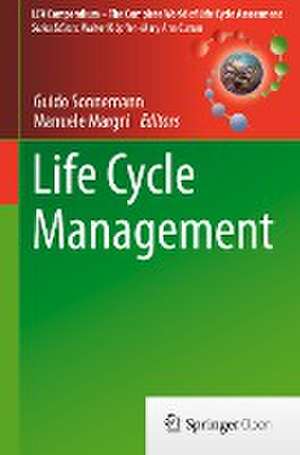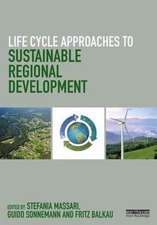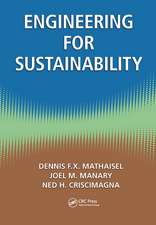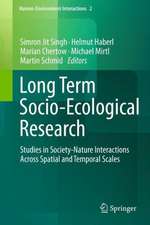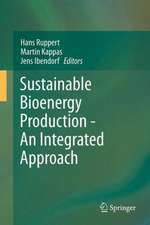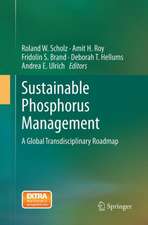Life Cycle Management: LCA Compendium – The Complete World of Life Cycle Assessment
Editat de Guido Sonnemann, Manuele Margnien Limba Engleză Hardback – 24 iul 2015
| Toate formatele și edițiile | Preț | Express |
|---|---|---|
| Paperback (1) | 375.53 lei 38-44 zile | |
| SPRINGER NETHERLANDS – 23 oct 2016 | 375.53 lei 38-44 zile | |
| Hardback (1) | 403.20 lei 38-44 zile | |
| SPRINGER NETHERLANDS – 24 iul 2015 | 403.20 lei 38-44 zile |
Preț: 403.20 lei
Nou
Puncte Express: 605
Preț estimativ în valută:
77.15€ • 80.55$ • 63.85£
77.15€ • 80.55$ • 63.85£
Carte tipărită la comandă
Livrare economică 01-07 aprilie
Preluare comenzi: 021 569.72.76
Specificații
ISBN-13: 9789401772204
ISBN-10: 9401772207
Pagini: 250
Ilustrații: XVII, 353 p. 49 illus., 28 illus. in color.
Dimensiuni: 155 x 235 x 22 mm
Greutate: 0.86 kg
Ediția:1st ed. 2015
Editura: SPRINGER NETHERLANDS
Colecția Springer
Seria LCA Compendium – The Complete World of Life Cycle Assessment
Locul publicării:Dordrecht, Netherlands
ISBN-10: 9401772207
Pagini: 250
Ilustrații: XVII, 353 p. 49 illus., 28 illus. in color.
Dimensiuni: 155 x 235 x 22 mm
Greutate: 0.86 kg
Ediția:1st ed. 2015
Editura: SPRINGER NETHERLANDS
Colecția Springer
Seria LCA Compendium – The Complete World of Life Cycle Assessment
Locul publicării:Dordrecht, Netherlands
Public țintă
Professional/practitionerCuprins
Part I: Introducing Life Cycle Management.- Introduction: Life Cycle Management.- Life Cycle Management: Implementing Sustainability in Business Practice.- Life Cycle Management as a Way to Operationalize Sustainability Within Organizations.- How to Implement Life Cycle Management in Business?.- Life Cycle Sustainability Assessment: A Tool for Exercising due Diligence in Life Cycle Management .- Life Cycle Management: Labeling, Declarations and Certifications at the Product Level —Different Approaches.- Mainstreaming the Use of Life Cycle Management in Small and Medium Sized Enterprises Using a Sector Based and Regional Approach.- Part II: Advancing the Implementation of Life Cycle Management in Business Practice.- From Projects to Processes to Implement Life Cycle Management in Business.- How to Make the LCA Team a Business Partner.- Sustainability Improvements and Life Cycle Approaches in Industry Partnerships.- Sustainable Value Creation with Life Cycle Management.- Part III: Life Cycle Management as Part of Sustainable Consumption and Production Strategies and Policies.- Hotspots Analysis: Providing the Focus for Action.- From Sustainable Production to Sustainable Consumption.-Life Cycle Management Responsibilities and Procedures in the Value Chain.- Policy Options for Life Cycle Assessment Deployment in Legislation.- Part IV: Mainstreaming and Capacity Building on Life Cycle Management.- Taking Life Cycle Management Mainstream: Integration in Corporate Finance and Accounting.- Building Organizational Capability for Life Cycle Management.- Promoting Life Cycle Thinking, Life Cycle Assessment and Life Cycle Management Within Business in Brazil.- Mainstreaming Life Cycle Sustainability Management in Rapidly Growing and Emerging Economies Through Capacity-building.-Communication and Collaboration as Essential Elements for Mainstreaming Life Cycle Management.-Part V: Implementation and Case Studies of Life Cycle Management in Different Business and Industry Sector.-Exploring Challenges and Opportunities of Life Cycle Management in the Electricity Sector.- Life Cycle Management Applied to Urban Fabric Planning.- Implementing Life Cycle Engineering in Automotive Development as a Helpful Management Tool to Support Design for Environment.- Managing Life cycle Sustainability Aspects in the Automotive Industry.- Life Cycle Management as a Way to Operationalize the Creating Shared Value Concept in the Food and Beverage Industry: A Case Study.
Recenzii
“The book succeeds in achieving all the stated goals, and I recommend it to a vast audience of scientists and professionals. Indeed, it is very valuable for the scientific community. It provides the state-of-the-art reference supported by a comprehensive bibliography and adopts a rigorous scientific approach. Moreover, it is also of strong interest for practitioners and professionals, in both private and public organizations, with many examples of practical applications.” (Paolo Masoni, The International Journal of Life Cycle Assessment, Vol. 21, 2016)
Notă biografică
Manuele Margni is associate professor at the Mathematical and Industrial Engineering department at Polytechnique Montréal. He is co-chair holder of the International Life Cycle Chair, a research unit of CIRAIG. His research activities aim to develop life cycle based tools to support sustainable production and consumption with a focus on the assessment of life cycle impacts, risks and benefits related to existing and new product systems. He co-developed USETox (www.usetox.org), a model based on scientific consensus for characterizing human and ecotoxicological impacts of chemical emissions, the life cycle impact assessment methodology IMPACT 2002+ and its update IMPACT World+. He’s teaching environmental modeling of toxic emissions, life cycle assessment and sustainable manufacturing classes. Parallel to his research activities Manuele gained a considerable experience working together with industry co-founding two companies: Ecointesys and Quanis, this latter being a spin-off from the Swiss Federal Inst
itute of Technology, where he still retain a key advisory role.
itute of Technology, where he still retain a key advisory role.
Textul de pe ultima copertă
This book provides insight into the Life Cycle Management (LCM) concept and the progress in its implementation. LCM is a management concept applied in industrial and service sectors to improve products and services, while enhancing the overall sustainability performance of business and its value chains. In this regard, LCM is an opportunity to differentiate through sustainability performance on the market place, working with all departments of a company such as research and development, procurement and marketing, and to enhance the collaboration with stakeholders along a company’s value chain. LCM is used beyond short-term business success and aims at long-term achievements by minimizing environmental and socio-economic burden, while maximizing economic and social value.
Caracteristici
Illustrates how Life Cycle Management is or can be integrated into business practice, thereby creating sustainability within organizations Provides thorough insight into Life Cycle Management, its origin, evolution and state of practice, including progress made and current challenges Sketches the operationalization of Life Cycle Management in organizations and its linkage to business value creation Contributors from both research and practice domains offer the reader a qualified and comprehensive understanding of this dynamic and increasingly relevant field of business practice Includes supplementary material: sn.pub/extras
